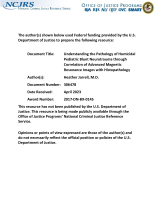Evaluative Research
Pivoting Headspace Ethanol Analysis to Accommodate Modern Day Scenarios
Research & Evaluation of Boston's Community Violence Intervention & Prevention Initiative
NIJ Community Violence Intervention Research and Evaluation Training and Technical Assistance (TTA) Center
Evaluation of a Healing-Centered Community-Wide Approach to Addressing Firearm Violence in New Orleans
FIU - Forensic Technology Center of Excellence
A Nationwide Assessment of Jail Reentry Policies and Practices: A Two-Tiered Study of the Field
Understanding the Implementation and Impact of Credible Messenger Mentoring on Youth Across Settings
Funding Support for the Operations of the Committee on Law and Justice of the National Academies of Sciences, Engineering, and Medicine
Expanding Mental Health Diversion Opportunities: A Prospective Evaluation of the Los Angeles County Intake Booking Diversion Program
21st Century Criminal Defense Practice: An Examination of the Impact of Holistic Defense in Wayne County, Michigan
Regulating Data Bias in Intelligent Decision Making
Evaluation of the California Human Trafficking Victim Assistance Grant Program
Criminal Justice Technology Testing and Evaluation Center
De-escalation Training: What Works, Implementation Lessons, and Taking It to Scale; Plenary at the 2023 NIJ Research Conference
Police use of force, while infrequently used, is a tremendous concern to public safety in the United States when officers employ it excessively or inappropriately, causing injury or death and eroding public trust in law enforcement. This plenary from the 2023 NIJ Research Conference describes the Integrating, Communications, Assessment, and Tactics (ICAT) de-escalation training program developed by the Police Executive Research Forum to guide officers in defusing critical incidents.
See the YouTube Terms of Service and Google Privacy Policy
2023 NIJ Research Conference Opening Ceremony
The theme of NIJ’s 2023 Research Conference was “evidence to action,” and our goal was to bring researchers and practitioners together to learn about the latest research evidence and how it can be implemented to promote safety, equity, and justice.
The opening ceremony included remarks from U.S. Attorney General Merrick B. Garland, Assistant Attorney General for the Office of Justice Programs Amy Solomon, and NIJ Director Nancy La Vigne.
See the YouTube Terms of Service and Google Privacy Policy
Comprehensive / Holistic Public Safety Approach using research, analysis and evaluation, of problem nature codes in the City of Minneapolis for Alternative Response development.
The Effectiveness of Prison Programming: A Review of the Research Literature Examining the Impact of Federal, State, and Local Inmate Programming on Post-Release Recidivism
Estimating Age of Death from Subadult Remains, Part 1
The long-standing problem of estimating the age and sex of subadult skeletal remains has been significantly "solved" with the advances in understanding the growth and development patterns in the skeletons of young people. Kyra Stull, an anthropologist and forensic researcher at University of Nevada, Reno, and Danielle McLeod-Henning, a physical scientist at NIJ, share more about this research with NIJ writer and host Jim Dawson.






